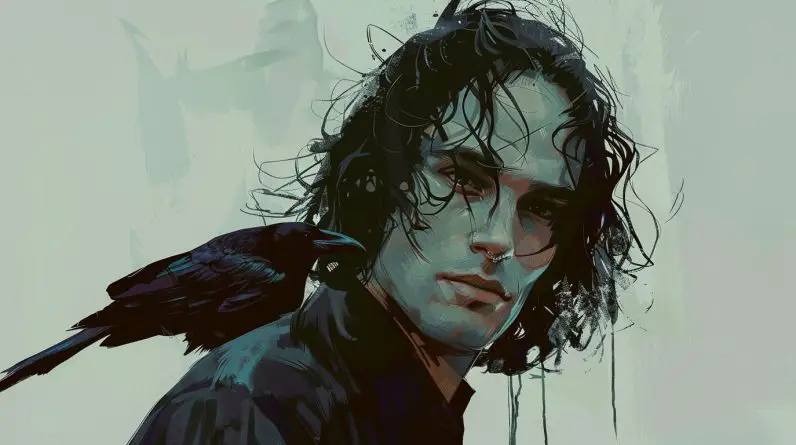
In the world of cinema, few stories are as poignant and compelling as that of Brandon Lee. Born into martial arts royalty as the son of the legendary Bruce Lee, Brandon’s life was a blend of cinematic brilliance and tragedy that continues to captivate fans worldwide. As a reboot of The Crow lingers on the horizon, attracting largely negative attention from those who consider the original inextricably linked to Brandon Lee’s memory, this article seeks to explain why. Delving into the life of Brandon Lee, tracing his journey from a childhood shadowed by his father’s significant imprint, through his early years in the film industry, to his breakthrough in Hollywood and his untimely death, all while reflecting on the undying influence he left behind.
Childhood and Family Connections
Brandon Bruce Lee was born on February 1, 1965, in Oakland, California, to martial arts icon Bruce Lee and Linda Lee Cadwell. Growing up in Hong Kong after his family relocated there in 1971, Brandon was exposed to the cinematic world from a young age, given his father’s burgeoning film career. However, his childhood was abruptly marked by tragedy when his father died in 1973, a loss that would profoundly impact Brandon’s life and career.
The Hong Kong Beginnings
Despite the shadow of his father’s monumental legacy, Brandon sought to make his own mark in the acting world. His early years in the film industry were spent in Hong Kong, where his father received his own big breaks. Similarly, it was here that Brandon began to learn the ropes of acting and martial arts, a combination that would later define his career. After a series of minor roles in television and film, he landed his first starring role in “Legacy of Rage” (1986), a Hong Kong action film that garnered him significant attention. The film hasn’t aged particularly well, though Brandon’s radiant on-screen charisma continues to shine through, making it clear why this role led to further opportunities.
Breakthrough in Hollywood
Brandon’s ambition and talent eventually led him back to the United States, where he pursued acting with fervor. His roles in Hollywood films like Showdown in Little Tokyo (1991) and Rapid Fire (1992) showcased his abilities as a leading man capable of carrying both the dramatic weight and the physical demands of his roles. Rapid Fire, in particular, showed Brandon to be an adaptable performer, with his stunt work, incorporation of scenery and props into his action sequences and his dynamic presence would recall the work of Jackie Chan. These roles also displayed early signs of Brandon’s subtle comic charm, which would lend substance and appeal to his characters going forward. In fact, although Brandon was proficient in martial arts and deeply respected his father’s legacy, he longed to tackle roles that weren’t straight martial arts action films, and indeed, one such cross-over project soon came calling.
The Crow and Its Tragic Aftermath
Brandon’s career reached its zenith with The Crow (1994), a dark, gothic tale of love and revenge that has since become a cult classic. For a comic-inspired movie, The Crow was startlingly ambitious in its style and substance, and Brandon made the character of Eric Draven his own, combining action sequences that would later inspire films such as The Matrix, with a slick revenge tale that would later bleed into movies such as John Wick. His performance has been widely acclaimed by fans and critics alike, and would no doubt have leap-frogged Brandon into the upper echelons of Hollywood leading men.
Tragically, though, it was during the filming of this movie that Brandon Lee lost his life in a freak accident on set. On March 31, 1993, he was fatally wounded by a prop gun that was mistakenly loaded with the tip of a real bullet. Brandon’s death at the age of 28 sent shockwaves through the film industry and his fanbase, echoing the untimely death of his father two decades earlier. With the blessing of Brandon’s family, director Alex Proyas finished the film, with a combination of digital effects and stunt doubles being used to complete unfinished scenes, which enabled the film to stand as an enduring and defining memory of Brandon. It’s for this reason that Alex Proyas and others have objected to a rebooting of the film, since it’s considered not only an impressive work of cinema, but an epitaph of sorts for Brandon.
A Legacy Worth Protecting
Despite his brief career, Brandon Lee left an indelible mark on Hollywood and martial arts cinema. His performances, especially in The Crow, showcased his unique ability to convey deep emotional resonance while executing physically demanding roles. The film’s release after his death served as a poignant reminder of his talent and potential, making it a touchstone for discussions on actor safety and the importance of meticulousness on film sets.
The legacy of Brandon Lee has become a symbol of artistic triumph and personal tragedy. It underscores the importance of vigilance and safety in filmmaking, a lesson learned at a great cost. Brandon’s family, especially his mother, Linda Lee Cadwell and sister, Shannon Lee, has been instrumental in preserving his legacy, ensuring that his life and work continue to inspire future generations.
Brandon Lee’s story is a testament to the impact one individual can have, regardless of the brevity of their time in the spotlight. His legacy endures not only in his films but also in the ongoing discussions about actor safety, the preservation of his father’s martial arts philosophy, and the inspiration he continues to offer to those who face adversity in pursuing their dreams. Brandon Lee’s light may have been extinguished too soon, but the brilliance of his life’s work shines on, reminding us of the power of resilience, the importance of legacy, and the indomitable spirit of a truly remarkable individual.






